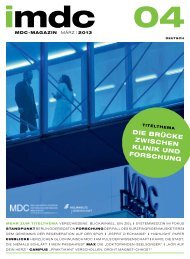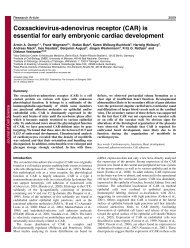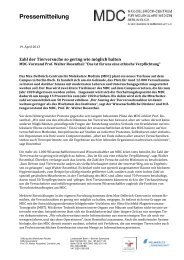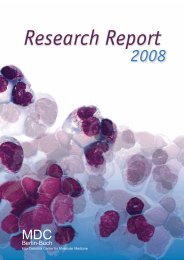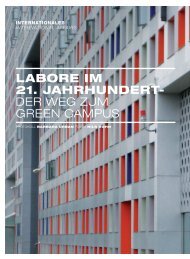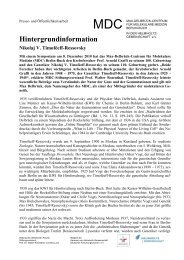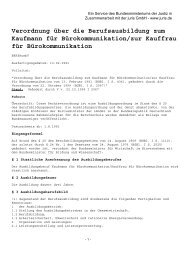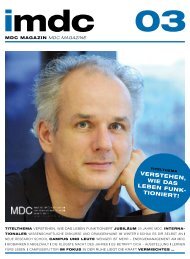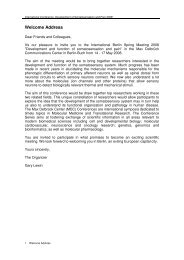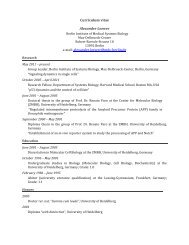iMDC03 zum Download (pdf)
iMDC03 zum Download (pdf)
iMDC03 zum Download (pdf)
Sie wollen auch ein ePaper? Erhöhen Sie die Reichweite Ihrer Titel.
YUMPU macht aus Druck-PDFs automatisch weboptimierte ePaper, die Google liebt.
The Quest to Understand “How Life Works”!<br />
“The scientific environment,” he said. “I think that’s what’s most important. And<br />
the MDC is one of the top institutes worldwide.” Moreover, he added, “Berlin is a<br />
great location for medical systems biology – due to the traditional link between<br />
basic research and medicine.” That is somehow a self-fulfilling prophecy, because<br />
Professor Rajewsky is the initiator and scientific head of the Berlin Institute for<br />
Medical Systems Biology (BIMSB). He wrote the concept proposal that convinced<br />
the MDC Board of Directors, Berlin colleagues, an international panel of experts and<br />
government policy makers to approve the project. “The funding agencies responded<br />
with surprising speed,” he said. It was just the opposite of what is commonly<br />
rumored about the political arena and administrative red tape: “Our concept was<br />
implemented in a short time, and we have a commitment from the state of Berlin<br />
for a new thirty-million-euro building in Berlin-Mitte.” It was a challenge to realize<br />
such a large project, which was accomplished jointly with the MDC Board of Directors.<br />
He added: “For the successful development of the BIMSB, it has been and is<br />
essential to have innovative science management.” And this has paid off: Together<br />
with additional institutional funding through the Federal Ministry of Education and<br />
Research (BMBF), a branch institute of the MDC shall be established on the north<br />
campus of Humboldt University that will employ three hundred people – and this in<br />
a very promising research field. “Scientific discoveries cannot be planned,” he says,<br />
“but good infrastructure can.”<br />
Campus Berlin-Buch and the Rajewsky labs are the best examples for this. Black<br />
servers buzz in the basement, competing with the ventilation system as to which is the<br />
noisiest: This is where the core of the facility is located, representing an investment of<br />
millions of euros in high-performance computers. State-of-the-art equipment is situated<br />
on the floors above, where young people from all over the world are working at lab<br />
benches and consoles. The tall researcher stops for a chat with each one of them – and<br />
not only because the photographer is documenting it all. Everywhere there is a topic to<br />
discuss: here about the flatworms, there about the latest sequencer. In modern biology<br />
“technology really drives research,” Professor Rajewsky says. “At the MDC, we strive to<br />
combine the latest technology with scientific questions and thus to develop methods<br />
and science further.” His enthusiasm is palpable and becomes even more apparent when<br />
he talks about his group: “The people on my team are all just great. I’m impressed!”<br />
About the Leibniz Prize<br />
The Gottfried Wilhelm Leibniz Prize is awarded<br />
annually by the German Research Foundation.<br />
The prize was established in 1986, and since then<br />
300 prizes have been awarded. Of these, 103 have<br />
been in the field of science, 87 in the life sciences,<br />
64 in the humanities and social sciences and 46<br />
in the engineering sciences. A maximum of<br />
EUR 2.5 million is provided per award and can<br />
be used for seven years at the prizewinner’s discretion<br />
for his/her research work, without having to<br />
submit interim proposals. After receiving this most<br />
prestigious German research prize, six Leibniz<br />
prizewinners have gone on to receive the Nobel<br />
Prize. More information at: www.dfg.de<br />
Other Leibniz Prizewinners<br />
at the MDC<br />
Professor Thomas Jentsch was awarded the<br />
Leibniz Prize in 1995 while he was director of the<br />
Institute for Molecular Neuropathobiology at the<br />
Center for Molecular Neurobiology Hamburg,<br />
University Hospital Hamburg-Eppendorf. In 2006<br />
he came to Berlin-Buch and has since headed the<br />
research group “Physiology and Pathology of Ion<br />
Transport” at the FMP and the MDC.<br />
Since 1995 the molecular biologist Professor<br />
Carmen Birchmeier has been conducting<br />
research at the MDC in the fields of developmental<br />
biology and signal transduction in nerve and<br />
muscle cells. In 2002 she was awarded the Leibniz<br />
Prize for her work. To date, a total of 36 women<br />
have received the Leibniz Prize.<br />
imdc03 2012<br />
11



